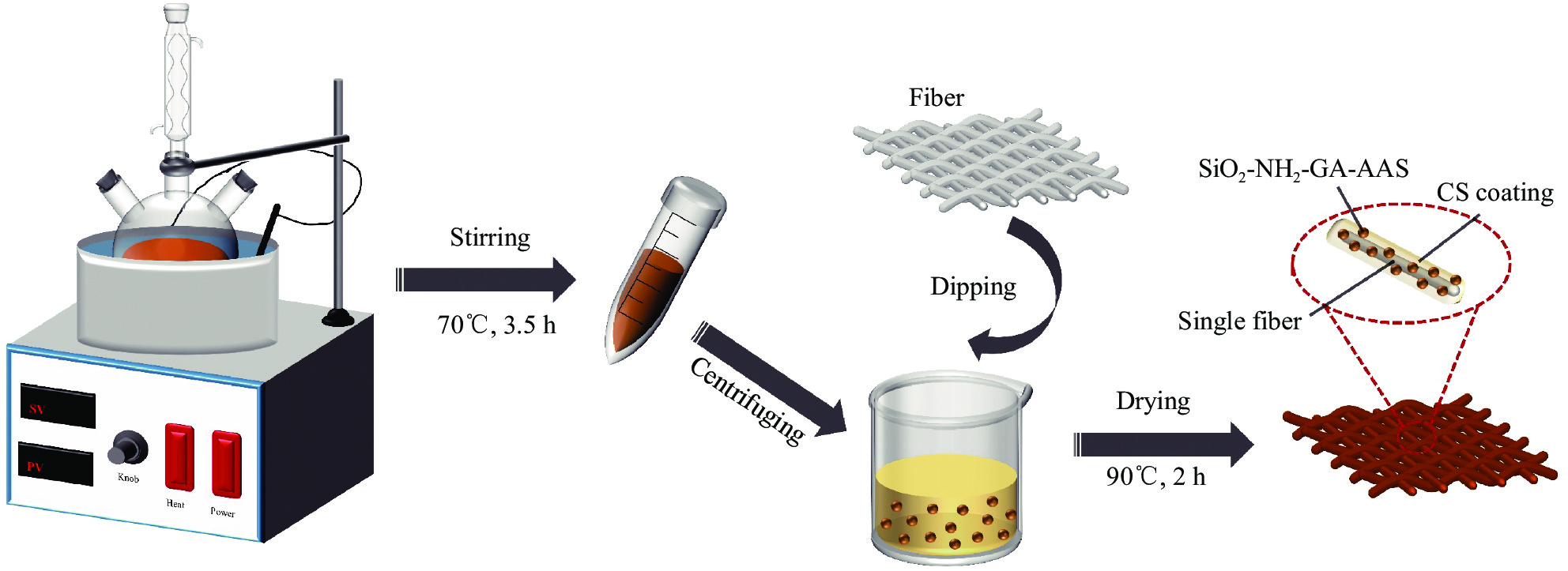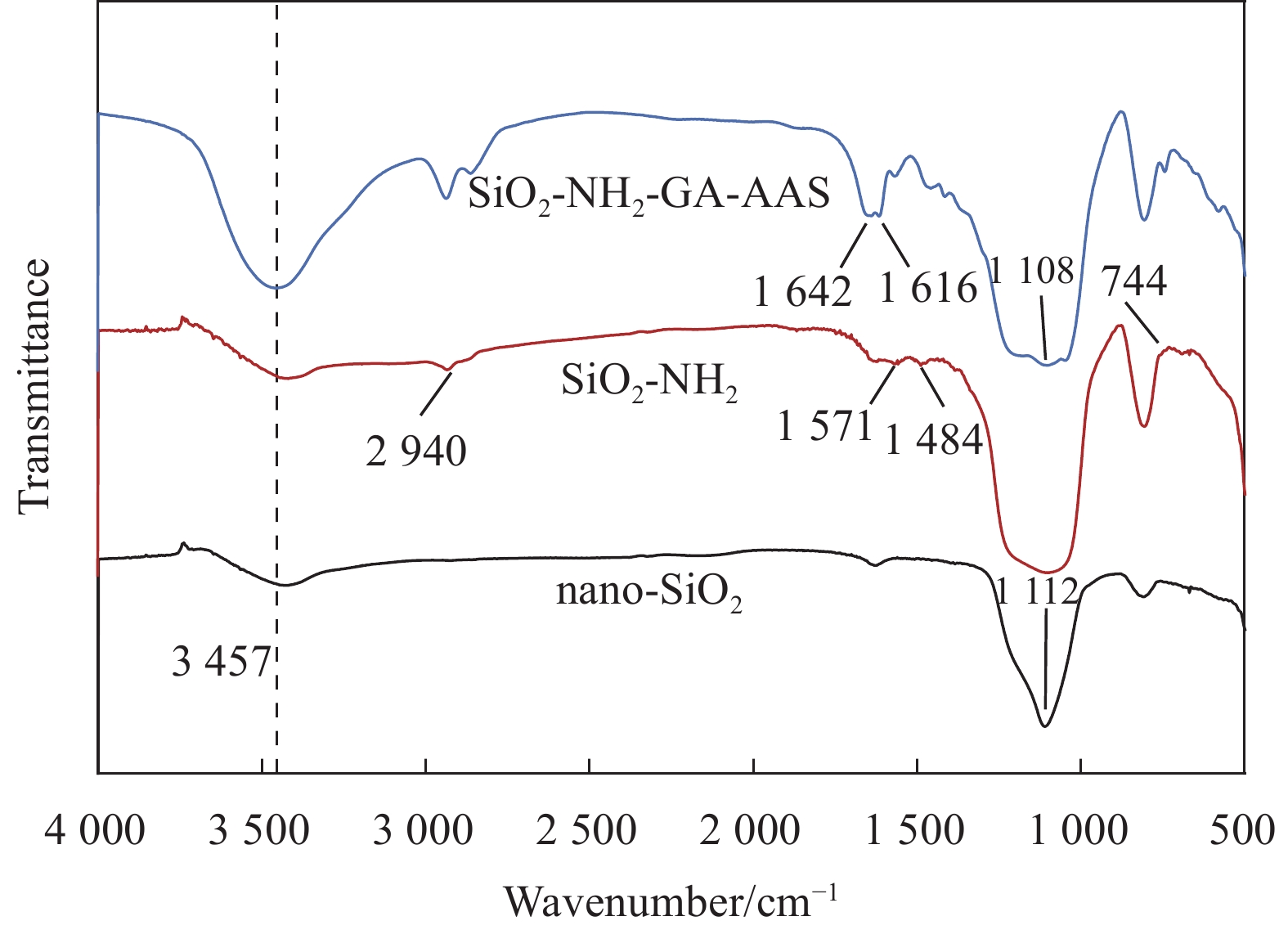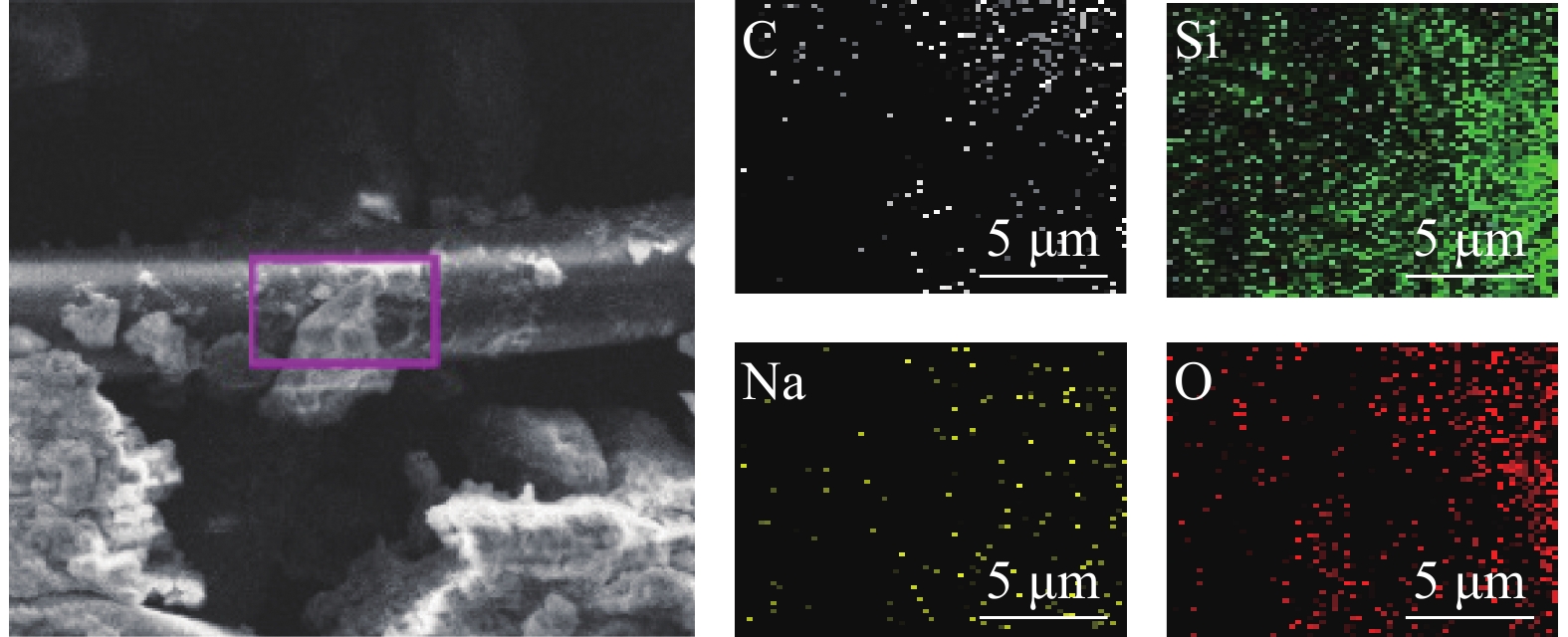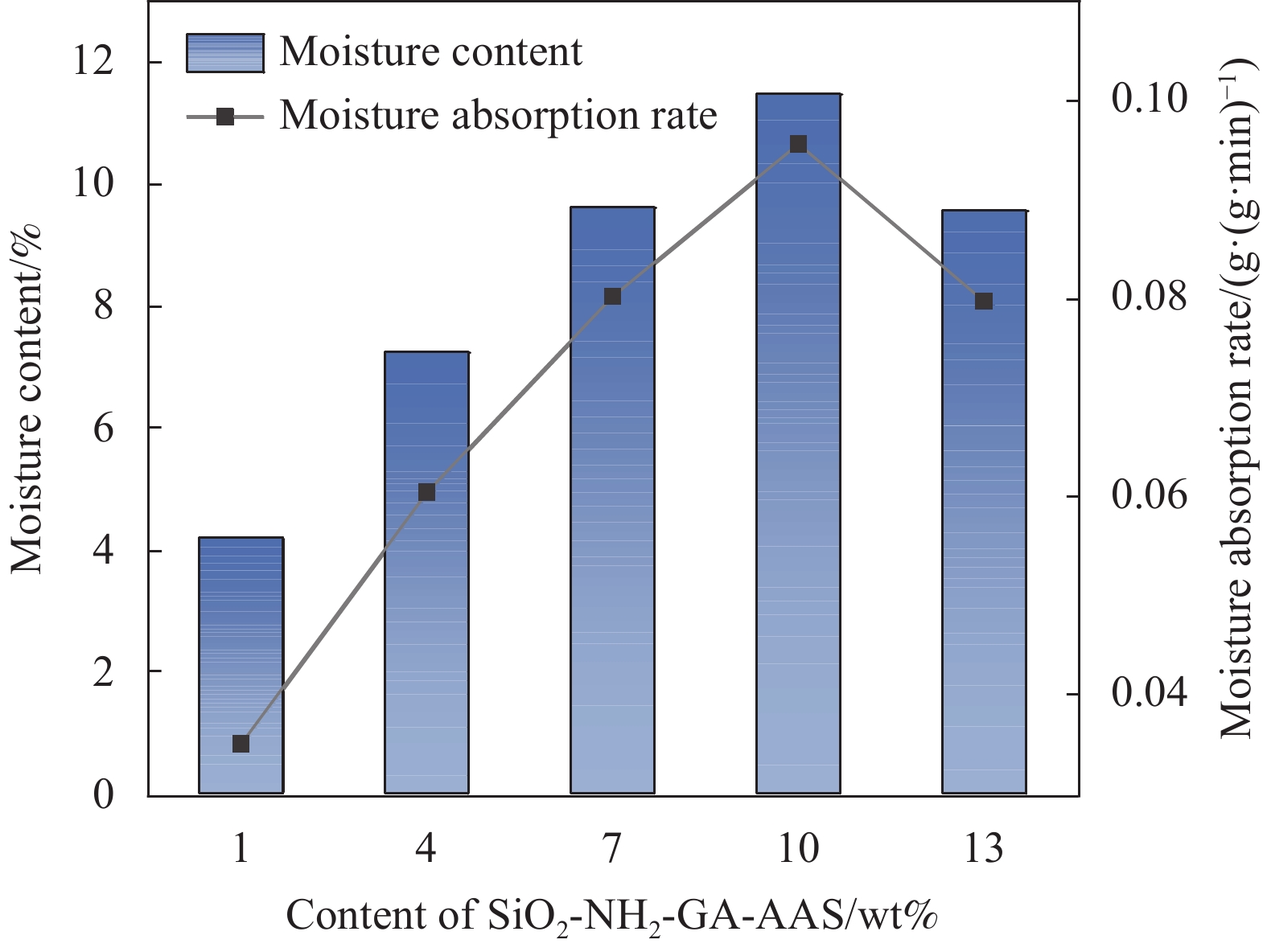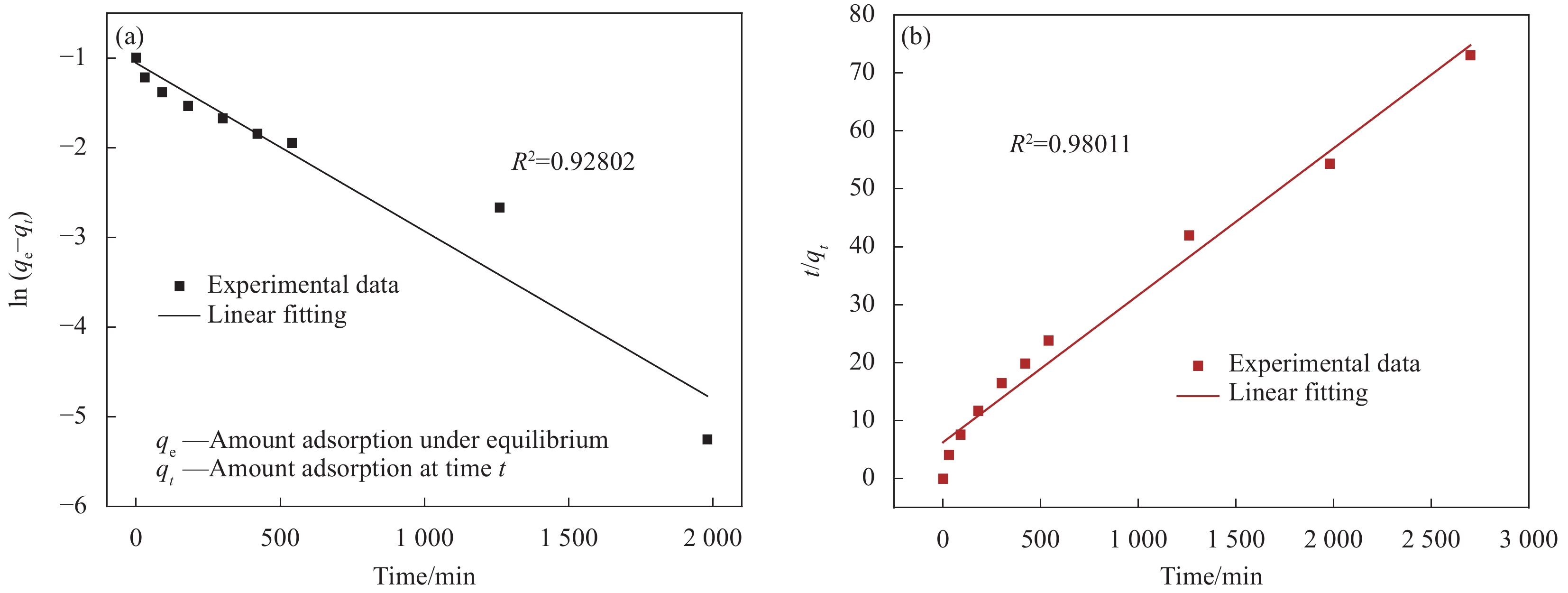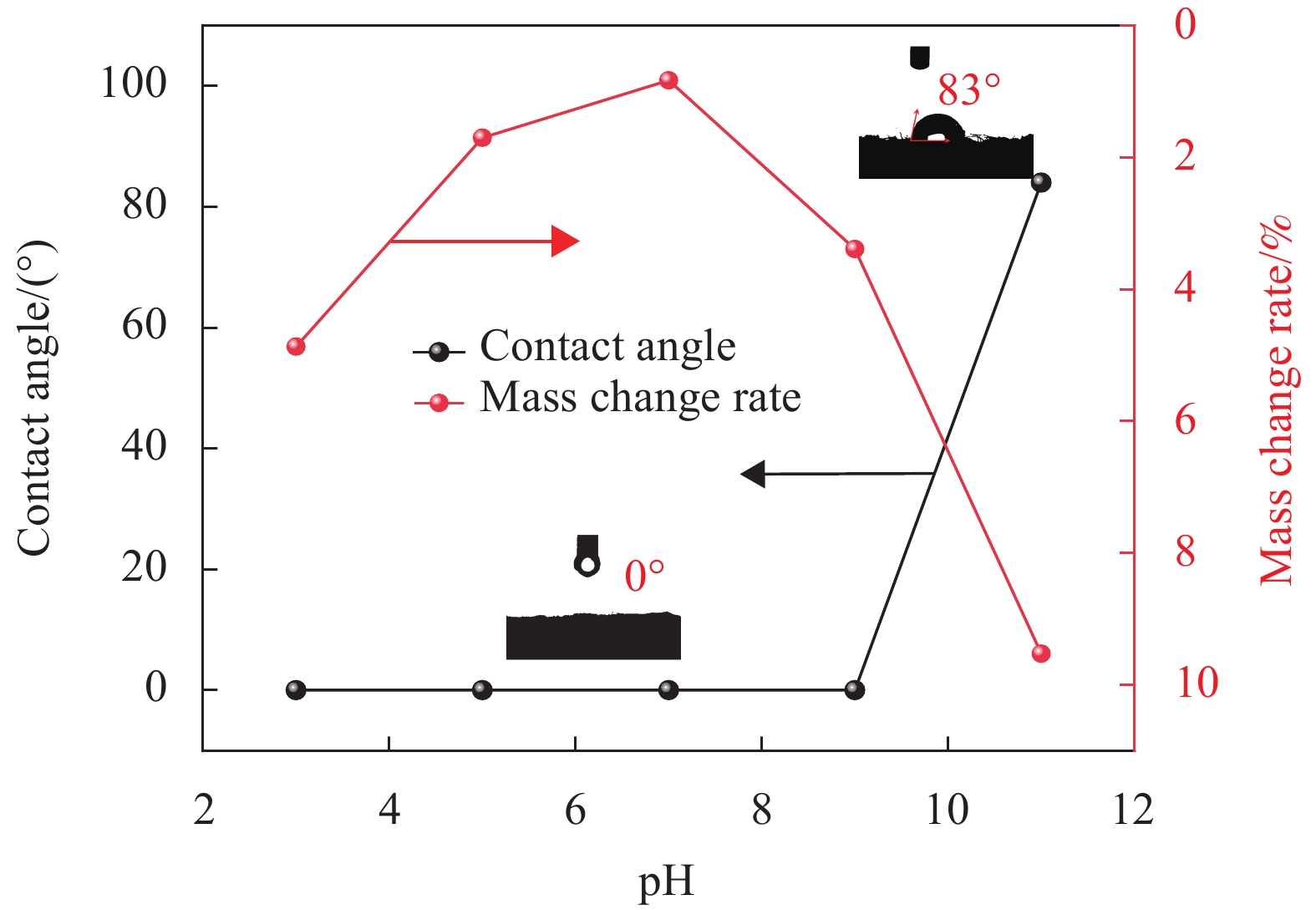Preparation and hygroscopic properties of SiO2-NH2-GA-AAS/CS Schiff base composite coating
-
摘要: 为得到轻便的高吸湿材料,制备席夫碱(Schiff)复合涂层对基体材料亲水改性以提高吸湿性能。利用戊二醛(GA)作为中间体共价连接氨基化纳米二氧化硅(SiO2)和亲水物质2-[(2-氨基乙基)氨基]乙磺酸钠(AAS)制得席夫碱复合材料(SiO2-NH2-GA-AAS),将其分散在壳聚糖(CS)溶液中制得SiO2-NH2-GA-AAS / CS复合涂层。以高分子材料聚对苯二甲酸乙二酯醇(PET)作为基材,采用浸渍的方法将复合涂层涂覆在其表面进行改性。采用FTIR、场发射扫描电子显微镜配备能谱仪(FESEM-EDS)和接触角测量仪对涂覆复合涂层后的PET基材的微观形貌、元素分布及表面润湿性进行表征分析,并对吸附过程进行伪一级、伪二级动力学模型拟合。结果表明:当SiO2-NH2/AAS质量比为1∶2,SiO2-NH2-GA-AAS用量为10wt%时,改性后的PET基材吸湿性能最佳。FESEM-EDS显示改性后的PET基材表面较均匀地附着复合涂层且含有Schiff复合材料的特征元素,同时接触角从原始的135°变为0°,达到了超亲水效果。在25℃、97%相对湿度(RH)环境下,最优复合涂层改性后的PET基材在经过45 h吸湿后达到平衡,吸湿率高达36.94%,吸湿性能得到了极大的提高,整个吸附过程符合伪二级动力学模型。Abstract: To get lightweight, highly hygroscopic materials, Schiff base composite coating was prepared to hydrophilically modify the matrix material to improve the hygroscopic performance. Glutaraldehyde (GA) as an intermediate was used to covalently link aminated nano-silica (SiO2) and the hydrophilic substance 2-[(2-aminoethyl)amino] ethanesulfonate sodium (AAS) to prepare Schiff base composite material (SiO2-NH2-GA-AAS), and then the SiO2-NH2-GA-AAS / CS composite coating was prepared by dispersing it in chitosan (CS) solution. The polymer polyethylene terephthalate alcohol (PET) was used as the base material, and the composite coating was coated on its surface by dipping to modify it. FTIR, field emission scanning electron microscope equipped with energy dispersive spectrometer (FESEM-EDS) and contact angle measuring instrument were used to test the microscopic morphology, element distribution and surface wettability of the PET substrate coated with composite coating. The adsorption process was fitted with Pseudo-first-order and Pseudo-second-order kinetic models. The results show the modified PET substrate has the best hygroscopic performance when mass ratio of SiO2-NH2/AAS is 1∶2 and the amount of SiO2-NH2-GA-AAS is 10wt%. From the FESEM-EDS analysis, it can be seen that the surface of the modified PET substrate is coated with a uniform composite material, and the contact angle changes from the original 135° to 0°, achieving the super-hydrophilic effect. In the environment of 25℃, 97% relative humidity (RH), the PET substrate coated with the optimum composite coating reaches moisture saturation after 45 h of moisture absorption which reaches 36.94% moisture content. The moisture absorption performance has been extremely improved. The whole adsorption process conforms to the Pseudo-second-order kinetic model.
-
Keywords:
- Schiff base /
- hydrophilic /
- moisture absorption /
- composite coating /
- adsorption kinetics
-
相对湿度是重要的环境参数,在人们生活、工作环境中过高的相对湿度会使人感觉不适并影响工作效率。工业产品的生产、储运对相对湿度也有一定的要求,如棉纺织、医药、食品、精密电子等。相对湿度过高会导致产品生产及质量问题,如纺织产品在储存期间发霉腐烂[1]、电子制品被腐蚀导致性能降低[2]、精密电器设备绝缘性下降发生漏电等。此外,钢铁冶金行业煤气中过高的水分会腐蚀管道、降低煤气热值;含水量较高的尾气会导致布袋除尘器糊袋,影响滤袋使用寿命及除尘效率。湿度过高不仅影响着人类自身的健康、工业产品的质量,除湿本质上也是节能降碳问题的核心,因此,除湿是一项迫在眉睫的艰巨任务。目前运用广泛的固体除湿剂如有机硅、分子筛、氧化铝等体积偏大且吸湿量偏低[3],制备轻便且吸湿能力强的高分子复合材料便成为目前的研究热点[4]。其中聚对苯二甲酸乙二酯醇(PET)因其耐磨性强、稳定性高、质轻而被广泛应用于各领域[5-7],但是由于结构式中缺乏亲水基团导致吸湿性能极差[8],因此,为了提高其吸湿性能需要对它进行亲水改性。
提高材料的亲水性可以通过物理/化学方法引入亲水基团,如—COOH、—OH、—SO3H、—CONH2等。如陈彬霞[9]利用等离子体对再生聚酯纤维表面进行亲水改性,引入—OH、—COOH、—N—O等极性官能团提高其亲水性能,改性后的纤维接触角由135º下降到0°,亲水性可保持30天。Zhang等[10]采用浸涂法通过戊二醛(GA)的桥接效应在聚酰胺纤维(PA6)表面成功接枝ε-Polylysine(PLL),引入其含有的亲水基团,水接触角在5 s内由121.8°变为0°。此外还可以通过加入无机粒子在材料表面构造粗糙来提高亲水性,因此,制备有机/无机复合材料成为当前材料改性的热点。Xu等[11]采用一步法制备了茶多酚/SiO2复合涂层,涂覆该涂层后的聚偏二氟乙烯(PVDF)膜亲水性大大提高,同时还具备一定的自清洁能力。Shokouhian等[12]将苯二胺接枝在碳纳米管上(p-PDA-MWCNT)并将其作为亲水改性剂对自制的聚砜纳滤膜进行改性,结果表明当p-PDA-MWCNT含量0.05%时聚砜纳滤膜接触角最小。Piccinini等[13]采用溶胶凝胶法制备含有SiO2/TiO2凝胶和三氟氯乙烯基醚(FEVE)树脂的有机-无机复合涂层并涂覆在玻璃上,发现由于TiO2的存在,改性后的玻璃在UV照射下实现由疏水到超亲水。
席夫碱(Schiff)反应由于能够产生亚胺键与金属离子生成配位聚合物,因此,常被用于分子催化[14-15]、功能材料制备[16]、气体及重金属吸附[17-18]等方面。因此,本文拟通过Schiff反应生成稳定的共价键结合无机组分和有机组分共同作用以提高基体材料表面亲水性能。利用戊二醛(GA)共价连接经3-氨丙基三乙氧基硅烷(APTES)改性后的SiO2纳米粒子和亲水物质2-[(2-氨基乙基)氨基]乙磺酸钠(AAS)生成SiO2-NH2-GA-AAS席夫碱复合材料,再将其分散在壳聚糖(CS)溶液中制成SiO2-NH2-GA-AAS/CS复合涂层,采用浸渍的方法将复合涂层涂覆在PET基材上对其进行改性,研究了氨基化SiO2和AAS比例及复合材料浓度对吸湿性能的影响,对改性前后的PET基材进行了FTIR、SEM、EDS表征分析,并对改性后的PET基材表面润湿性和稳定性进行了测试。
1. 实验材料及方法
1.1 原材料
无水乙醇(EtOH)、冰乙酸(CH3COOH)、戊二醛(GA,25%水溶液)、NaOH均为分析纯、硅烷偶联剂3-氨丙基三乙氧基硅烷(APTES)、壳聚糖(CS),均购自上海沪试实验室器材股份有限公司;nano-SiO2、2-[(2-氨基乙基)氨基]乙磺酸钠(AAS,50% in H2O)购自上海阿拉丁生化科技股份有限公司;实验室自制去离子水。
1.2 实验方法
1.2.1 APTES改性nano-SiO2粒子的制备
取3 g nano-SiO2于无水乙醇溶液中超声分散30 min后,取合适比例APTES水解一定时间,再将超声后的纳米粒子和经水解的APTES一并倒入三颈烧瓶中放置于集热式恒温磁力搅拌器中升温至80℃后磁力搅拌5 h,待反应结束后将产物用无水乙醇重复离心洗涤3次,最后得到产物放置在110℃烘箱中烘干研磨待用。
1.2.2 SiO2-NH2-GA-AAS席夫碱复合材料的制备
通过控制SiO2-NH2质量不变,改变SiO2-NH2和AAS的质量比例进行实验(表1)。分别称取GA和AAS加入无水乙醇中,随后将其加入三颈烧瓶中在70℃下回流冷凝1 h,之后加入相应比例的SiO2-NH2继续搅拌2.5 h,搅拌过程中滴加1~2滴CH3COOH以催化反应进行。反应完成后,利用无水乙醇反复洗涤、离心,直至滤液无色后将产物放置于90℃的烘箱烘干研磨装袋记号。
表 1 不同SiO2-NH2/2-[(2-氨基乙基)氨基]乙磺酸钠(AAS)质量比下的SiO2-NH2-戊二醛(GA)-AAS复合材料配方Table 1. SiO2-NH2-glutaraldehyde (GA)-2-[(2-aminoethyl)amino] ethanesulfonate sodium (AAS) composite material formulations under different mass ratio of SiO2-NH2/AASSample
numberMass ratio of SiO2-NH2/AAS SiO2-NH2/g AAS/g GA/g SiO2-NH2-GA-AAS0.125 4∶1 0.5 0.125 0.0657 SiO2-NH2-GA-AAS0.25 2∶1 0.5 0.25 0.1315 SiO2-NH2-GA-AAS0.5 1∶1 0.5 0.5 0.2631 SiO2-NH2-GA-AAS1.0 1∶2 0.5 1 0.5263 SiO2-NH2-GA-AAS2.0 1∶4 0.5 2 1.0527 1.2.3 SiO2-NH2-GA-AAS/CS复合涂层的制备
称取2 g CS溶于2%的醋酸溶液,在120℃下搅拌至CS全部溶解后冷却至室温待用。称取一定质量分数(1wt%、4wt%、7wt%、10wt%、13wt%)的SiO2-NH2-GA-AAS复合材料加入配制好的CS溶液中超声分散5 min使其均匀分散在壳聚糖溶液中。
使用EtOH将PET基材(2 cm×2 cm)超声清洗30 min后放入烘箱烘干。配制质量分数为3%的NaOH溶液,在85℃下按1:50浴比将清洗后的PET基材浸入搅拌1.5 h,后用去离子水洗涤至溶液pH呈中性,放置在100℃烘箱中烘干待用。将碱处理后的PET基材于室温下浸渍在SiO2-NH2-GA-AAS/CS复合涂层中2 h后取出,再利用去离子水洗去未牢固附着在其表面的复合涂层,最后放置于烘箱中在90℃温度下烘干(图1)。
1.3 测试与表征
利用JC2000 D4 G型接触角测量仪(上海中晨数字设备有限公司)测试改性前后PET基材表面水接触角变化;采用傅里叶红外光谱仪Nicolet 6700型(美国尼高力公司)测试SiO2-NH2-GA-AAS合成过程中官能团的变化。通过NANO SEM430型(FEI公司)场发射扫描电子显微镜观察改性前后PET基材表面形貌及EDS分析。
将改性前后的PET基材干燥至恒重放置于称量瓶中一并放入盛有饱和盐溶液的干燥器挡板上方进行吸湿。吸湿一定时间后取出,利用精度0.00001的天平进行称重,计算其吸湿率。吸湿率
w 表达式为w=mt−m0m0×100% (1) 其中:
mt 指t时刻试样的质量(g);m0 是初始时试样的质量(g)。2. 结果与讨论
2.1 SiO2-NH2-GA-AAS/CS复合涂层合成机制
为了提高PET基体材料的吸湿性能,利用制备的SiO2-NH2-GA-AAS复合材料分散于CS溶液中制得SiO2-NH2-GA-AAS/CS复合涂层对其进行改性。复合材料的合成经由以下步骤:APTES经水解生成相应的硅醇缩合物和乙醇;利用水解后的APTES对nano-SiO2改性使其表面接枝氨基;采用GA作为桥梁通过醛胺缩合反应生成亚胺键连接无机组分氨基化nano-SiO2及有机组分AAS,反应机制图如图2所示。复合涂层中富含的大量亲水基团能够吸附空气中更多的水分,同时纳米粒子在PET基材表面构造的微纳粗糙结构能使空气中被吸附的水分在表面更加快速、完全的铺展开来[19],两者相结合共同增强PET的吸湿能力。
图3是nano-SiO2改性前后的FTIR图谱。图3(a)中位于3400 cm−1左右的宽峰及1112 cm−1左右的尖峰归属于nano-SiO2粒子表面的—OH基团的伸缩振动峰和弯曲振动峰[20]。与nano-SiO2相比,经APTES改性后的nano-SiO2在2940 cm−1左右处出现了归属于C—H的对称伸缩振动,见图3(b),1571 cm−1处出现了明显的N—H的弯曲振动吸收峰[21],验证了氨基在nano-SiO2表面接枝成功。由图3(c)的SiO2-NH2-GA-AAS的FTIR图谱可以看出在1642 cm−1处出现了nano-SiO2和表面氨基化nano-SiO2都没有出现的特征峰,其属于亚胺键C=N,证实了席夫碱的形成。而在3457 cm−1出现的强吸收峰可能是由于AAS中的—NH键形成的,1108 cm−1处是属于S—O的振动峰,说明亲水物质AAS和 nano-SiO2通过共价键紧密结合在一起成功制得复合材料。
2.2 表面元素分析
复合涂层改性后的PET基材表面主要元素含量如表2所示。根据PET的结构式看其主要含有C和O元素,而经过改性后其表面多出了Si、S、Na等元素,Si主要来自无机组分nano-SiO2,而S和Na则来自亲水物质AAS,证明了亲水物质通过GA共价结合在纳米粒子上成功合成了席夫碱。图4为改性后PET基材表面主要元素的EDS能谱。可看出复合材料元素分布较均匀,表明复合涂层成功结合在PET基材表面以提高其亲水性能。
表 2 改性后PET基材表面元素含量Table 2. Surface element content of modified PETElement C O Si S Na Mass fraction/wt% 46.11 45.52 7.04 1.17 0.16 2.3 SiO2-NH2-GA-AAS/CS复合涂层的吸湿性能
图5是涂覆不同质量比SiO2-NH2/AAS制备的SiO2-NH2-GA-AAS/CS复合涂层的PET基材在25℃,97%相对湿度(RH)环境下2 h内的吸湿率及吸湿速率,探究了无机纳米粒子和亲水物质的最优配比。可以看出随着AAS的增加吸湿率和吸湿速率呈逐渐上升的趋势,主要是由于涂覆复合涂层后PET基材表面亲水基团的增加及纳米粒子构造的微纳粗糙结构。当SiO2-NH2/AAS质量比为4∶1和2∶1时,由于SiO2-NH2接枝的亲水物质较少,吸湿率的增加主要来自于壳聚糖中的亲水基团及纳米粒子在表面构造的粗糙。SiO2-NH2/AAS质量比为1∶1时,吸湿率增长幅度最大,起主导作用的是AAS中的亲水基团,空气中的水分与亲水基团相互作用形成氢键[22]从而提高吸湿率。而随着AAS的持续增加吸湿速率明显减缓,表现为经SiO2-NH2-GA-AAS1.0/CS和SiO2-NH2-GA-AAS2.0/CS复合涂层改性后的PET基材吸湿率相差无几,可能由于SiO2-NH2表面的亲水基团接枝量到达饱和,也可能是亲水物质添加过多使复合涂层在PET基材表面出现堆积[23]。由于继续增加AAS亲水效果并不显著且耗费成本,综合考虑选择SiO2-NH2/AAS质量比为1∶2继续进行后续研究。
为了探究SiO2-NH2-GA-AAS浓度对改性后PET基材吸湿性能的影响,在壳聚糖溶液中添加不同含量的复合材料测试其在2 h内的吸湿率和吸湿速率,如图6所示。可以看出随着复合材料浓度的升高吸湿率呈现先增加后降低的趋势,在复合材料添加量为10wt%的时候吸湿率达到最大值11.48%。当继续增加复合材料含量时,吸湿率反而降低,这是由于(SiO2-NH2-GA-AAS)13wt%/CS涂层中复合材料浓度过高,导致涂层分布在纤维表面过于密集,过密的交联网络会使亲水性能大大降低[24]。此外,图7为SiO2-NH2-GA-AAS添加量为1wt%、4wt%、7wt%、10wt%和13wt% 时SiO2-NH2-GA-AAS/CS涂层表面状态。可以看出当复合材料添加量低于10wt%时,表面涂层均匀分布,超过10wt%后,PET基材表面部分涂层脱落且涂层表面出现裂纹,这也是使其吸湿率降低的原因。因此,当SiO2-NH2/AAS质量比为1∶2、SiO2-NH2-GA-AAS添加量为10wt%时,SiO2-NH2-GA-AAS/CS复合涂层性能最优。
图8为未经处理的PET、CS涂层改性后的PET基材及最优SiO2-NH2-GA-AAS/CS复合涂层改性后的PET基材在25℃、97% RH时达到吸湿饱和的曲线。经过45 h吸湿后3个样品达到了吸湿饱和,可以看出未经处理的PET的吸湿率很低且吸湿率随着时间的增加并未有明显增加趋势,一直维持在1%以下,最高仅有0.94%;在PET基材表面涂覆壳聚糖后,其在前9 h内吸湿率呈现明显增加的趋势,主要由于壳聚糖中固含的亲水基团导致吸湿率增加,但在9 h后吸湿率基本保持不变,最高也仅4.34%左右;对比之下PET-SiO2-NH2-GA-AAS/CS吸湿率增长速度十分显著,最高吸湿率达到36.94%。在84% RH时其饱和吸湿率可达到32.72%,依然维持在30%以上,证明了复合涂层能有效提高PET基材的吸湿性能。
采用伪一级动力学模型和伪二级动力学模型探讨PET-SiO2-NH2-GA-AAS/CS的吸附机制。
伪一级动力学模型:
ln(qe−qt)=lnqe−k1t (2) 伪二级动力学模型:
tqt=1k2q2e+tqe (3) 其中:
qe 表示的是平衡吸附量(g/g);qt 表示在t时刻的吸附量(g/g);k1 和k2 分别是伪一级、伪二级的动力学常数。图9分别显示了在25℃,97% RH的环境下
ln(qe−qt) 及t/qt 随时间的变化。通过拟合发现伪一级动力学模型的相关系数(R2=0.92802)小于伪二级动力学参数(R2=0.98011)。因此,相比伪一级动力学模型,伪二级动力学模型更能描述PET-SiO2-NH2-GA-AAS/CS整个吸附过程的规律,一定程度上说明整个吸附过程主要是化学吸附。2.4 表观形貌
图10是未经处理的PET及涂覆不同含量SiO2-NH2-GA-AAS/CS复合涂层的PET基材的SEM图像。由图10(a)可看出未经处理的PET表面没有任何附着物,十分光滑。随着浸渍不同浓度的复合涂层,纤维间隙开始出现大块团聚物,这主要是壳聚糖,表面也呈现不同程度的凸起,证实了SiO2-NH2-GA-AAS/CS涂层成功结合在纤维上。
随着SiO2-NH2-GA-AAS含量的增加,纤维表面复合材料附着量逐渐增多,直至添加量到达10wt%时,纤维表面的复合材料已经较均匀地分散在纤维表面构造了一定的粗糙。从图10(f1)看出继续添加用量后由于浓度过高,过量的附着物在纤维表面堆积且分布不均,这是导致涂层出现裂纹和脱落现象的主要原因。
2.5 水接触角
图11是未经处理的PET表面水接触图、水滴滴在SiO2-NH2-GA-AAS/CS涂层表面0 s时和1 s时的水接触角。经测试可知未经任何处理的PET基材表面水接触角高达135°,呈现疏水状态,相较之下水滴滴在复合涂层表面瞬间接触角变为0°,达到了超亲水效果。证明复合涂层富含来自AAS和CS的大量亲水基团,同时纳米粒子的存在增加了其粗糙性。有机组分和无机组分共同作用,提高了涂层表面的亲水性能。
2.6 稳定性
为了测试复合涂层的牢固度对其进行耐磨性能测试[25]。将PET-SiO2-NH2-GA-AAS/CS放置在砂纸上,上方放置50 g砝码匀速拉动样品,移动距离10 cm为一个循环,测试其在5、10、15、20、25个循环后表面接触角和质量损失率
F 。F=m0−mm0×100% (4) 其中:
m0 是测试前的试样质量(g);m 是测试后的试样质量(g)。图12是改性后PET基材经过不同磨损循环后的质量损失率及表面接触角变化。可以看出质量损失随着磨损次数的增加而增加,在经历25个磨损循环后质量损失率最高到达1.93%,同时在经历了不同磨损循环后其表面接触角保持0°并未改变,说明SiO2-NH2-GA-AAS/CS涂层不仅分散在PET基材表面还分散于其内部以维持强亲水性,以上证明了复合涂层具有优异的耐磨性能。
为了测试复合涂层的耐酸碱性能,利用HCl、NaOH和去离子水调配不同pH的溶液,将试样置于其中(pH=3、5、7、9、11)24 h,随后取出用去离子水清洗并干燥[26],测试其亲水性变化和质量变化(图13)。可以看出当pH为3~9时,表面涂层虽呈现不同程度的损耗但表面水接触角依然能保持0°,达到超亲水效果,但当pH达到11时,涂层损耗最大,质量损失率达到了9.53%,同时水接触角也上升到了83°,虽仍是亲水状态但效果大大下降,说明复合涂层具有更优异的耐酸性能。
3. 结 论
(1) 利用3-氨丙基三乙氧基硅烷(APTES)对nano-SiO2表面氨基化处理,通过戊二醛(GA)共价连接nano-SiO2和亲水物质2-[(2-氨基乙基)氨基]乙磺酸钠(AAS)制得席夫碱复合材料SiO2-NH2-GA-AAS,再将复合材料分散在壳聚糖(CS)溶液中制得亲水改性复合涂层,采用浸渍法将复合涂层涂覆在 PET基材上对其改性。实验结果表明当SiO2-NH2/AAS质量比为1∶:2,复合材料用量是10wt%时,复合涂层吸湿性最优。
(2) 对最优SiO2-NH2-GA-AAS/CS复合涂层改性后的PET基材、未经处理的PET、CS涂层改性的PET基材进行吸湿实验。在45 h后样品达到吸湿饱和,未经处理的PET最高只能达到0.94%的吸湿率,涂覆壳聚糖后吸湿率提高到4.34%,而改性后PET基材的吸湿率高达36.94%,吸湿性能得到极大提升。对吸附过程进行了伪一级和伪二级反应动力学模型的拟合,吸附过程更符合伪二级动力学模型。
(3) 对最优产物的表面润湿性进行测试。结果表明亲水改性效果显著,对比未经处理的PET,接触角从135°变为0°,达到了超亲水效果。
(4) SiO2-NH2-GA-AAS/CS复合涂层在经过25个磨损循环后表面接触角保持在0°,说明涂层具有优异的耐磨性;在经过浸泡在pH为3~9的水溶液24 h后,依然能维持超亲水状态,但当pH=11时,亲水效果下降,说明涂层具有优异的耐酸性。
-
表 1 不同SiO2-NH2/2-[(2-氨基乙基)氨基]乙磺酸钠(AAS)质量比下的SiO2-NH2-戊二醛(GA)-AAS复合材料配方
Table 1 SiO2-NH2-glutaraldehyde (GA)-2-[(2-aminoethyl)amino] ethanesulfonate sodium (AAS) composite material formulations under different mass ratio of SiO2-NH2/AAS
Sample
numberMass ratio of SiO2-NH2/AAS SiO2-NH2/g AAS/g GA/g SiO2-NH2-GA-AAS0.125 4∶1 0.5 0.125 0.0657 SiO2-NH2-GA-AAS0.25 2∶1 0.5 0.25 0.1315 SiO2-NH2-GA-AAS0.5 1∶1 0.5 0.5 0.2631 SiO2-NH2-GA-AAS1.0 1∶2 0.5 1 0.5263 SiO2-NH2-GA-AAS2.0 1∶4 0.5 2 1.0527 表 2 改性后PET基材表面元素含量
Table 2 Surface element content of modified PET
Element C O Si S Na Mass fraction/wt% 46.11 45.52 7.04 1.17 0.16 -
[1] JIN S X, YU Q F, LI M, et al. Quantitative evaluation of carbon materials for humidity buffering in a novel dehumidification shutter system powered by solar energy[J]. Building and Environment,2021,194:107714. DOI: 10.1016/j.buildenv.2021.107714
[2] CONSEIL-GUDLA H, JELLESEN M S, AMBAT R. Humidity control in electronic devices: water sorption properties of desiccants and related humidity build-up in enclosures[J]. IEEE Transactionson Components, Packaging and Manufacturing Technology,2021,11(2):324-332. DOI: 10.1109/TCPMT.2020.3045495
[3] LI K, LUO W, TSAI B, et al. Performance analysis of two-stage solid desiccant densely coated heat exchangers[J]. Sustainability,2020,12(18):7357. DOI: 10.3390/su12187357
[4] 孟维丹, 赵景丽, 王娇娜, 等. PAA/PVA复合纳米纤维膜的制备与吸湿性能研究[J]. 北京服装学院学报(自然科学版), 2022, 42(1):8-14. MENG W D, ZHAO J L, WANG Q N, et al. Proparation and properties of PAA/PVA composite nanofiber dryer[J]. Journal of Beijing Institute of Fashion Technology (Natural Science Edition),2022,42(1):8-14(in Chinese).
[5] FANG Y, SUN W, LIU H, et al. Construction of eco-friendly flame retardant and dripping-resistant coating on polyester fabrics[J]. Surface Engineering,2021,37(8):1067-1073. DOI: 10.1080/02670844.2021.1911458
[6] DONG W, QIAN F P, LI Q, et al. Fabrication of superhydrophobic PET filter material with fluorinated SiO2 nanoparticles via simple sol-gel process[J]. Journal of Sol-Gel Science and Technology,2021,98(1):224-237. DOI: 10.1007/s10971-021-05483-4
[7] PARK S J, KO T, YOON J, et al. Highly adhesive and high fatigue resistant copper/PET flexible electronic substrates[J]. Applied Surface Science,2018,427:1-9.
[8] 丁蕊蕊, 潘均安, 阳范文, 等. PET薄膜的亲水改性研究[J]. 表面技术, 2023, 52(4): 374-380. DING R R, PAN J A, YANG F W, et al. Study on hydrophilic modification of PET film[J]. Surface Technology, 2023, 52(4): 374-380(in Chinese).
[9] 陈彬霞, 周泽航, 卢灿辉. 等离子体辐照亲水改性再生聚酯纤维及其结构演变[J]. 高分子材料科学与工程, 2022, 38(1):43-49. CHEN B X, ZHOU Z H, LU C H. Hydrophilic modification and structure evolution of atmospheric plasma treated recycled ester fiber[J]. Polymer Materials Science & Engi-neering,2022,38(1):43-49(in Chinese).
[10] ZHANG W, LI J, TANG R, et al. Hydrophilic and antibacterial surface functionalization of polyamide fabric by coating with polylysine biomolecule[J]. Progress in Organic Coatings,2020,142:105571. DOI: 10.1016/j.porgcoat.2020.105571
[11] XU Q, JI X, TIAN J, et al. Inner surface hydrophilic modification of PVDF membrane with tea polyphenols/silica composite coating[J]. Polymers,2021,13(23):4186. DOI: 10.3390/polym13234186
[12] SHOKOUHIAN M, SOLOUKI S. p-Phenylenediamine grafted multi-walled carbon nanotubes as a hydrophilic modifier in thin-film nanocomposite membrane[J]. Polymer Bulletin,2020,77(7):3485-3498. DOI: 10.1007/s00289-019-02899-5
[13] PICCININI F, LEVI M, TURRI S. Photoactive sol-gel hybrid coatings from modified fluorocarbon polymers and amorphous titania[J]. Progress in Organic Coatings,2013,76(9):1265-1272. DOI: 10.1016/j.porgcoat.2013.03.026
[14] MANDAL A, SARKAR A, ADHIKA-RY A, et al. Structure and synthesis of copper based Schiff base and reduced Schiff base complexes: A combined experimental and theoretical investigation of biomimetic catalytic activity[J]. Dalton Transactions,2020,49(43):15461-15472. DOI: 10.1039/D0DT02784G
[15] KARGAR H, MOGHADAM M, SHARIATI L, et al. Synthesis, crystal structure, spectral characterization, theoretical studies, and investigation of catalytic activity in selective oxidation of sulfides by oxoperoxotungsten (VI) Schiff base complex[J]. Journal of Molecular Structure,2022,1257:132608. DOI: 10.1016/j.molstruc.2022.132608
[16] DEMIR R, KAYA I. Humidity properties of Schiff base polymers[J]. Open Chemistry,2018,16(1):937-943. DOI: 10.1515/chem-2018-0106
[17] REN L, YANG Z, HUANG L, et al. Macroscopic poly Schiff base-coated bacteria cellulose with high adsorption performance[J]. Polymers,2020,12(3):714. DOI: 10.3390/polym12030714
[18] SANG Y, CAO Y, WANG L, et al. Nrich porous organic polymers based on Schiff base reaction for CO2 capture and mercury (II) adsorption[J]. Journal of Colloid and Interface Science,2021,587:121-130. DOI: 10.1016/j.jcis.2020.12.002
[19] WANG X, HUANG W, FU L, et al. Preparation of superhydrophilic/underwater superoleophobic membranes for separateing oil-in-water emulsion: Mechanism, progress and perspective[J]. Journal of Coatings Technology and Research,2021,18(2):285-310. DOI: 10.1007/s11998-020-00428-y
[20] 董文杰, 阚泽. 聚氨基酸修饰的纳米二氧化硅的制备及在尼龙改性中的应用[J]. 高分子材料科学与工程, 2018, 34(10): 110-115. DONG W J, KAN Z. Preparation of poly(amino acid) modified nanosilicaand its application in nylon modification[J]. Polymer Materials Science and Engineering, 2018, 34(10): 110-115(in Chinese).
[21] 贾新利, 罗健辉, 王平美, 等. 具有双亲特性的水相哑铃型SiO2纳米粒子的制备[J]. 无机化学学报, 2021, 37(4):653-660. JIA X L, LUO J H, WANG P M, et al. Synthesis of dumbbell-like SiO2 nano particles with amphiphilic propertyes inaqueous phase[J]. Chinese Journal of Inorganic Chemistry,2021,37(4):653-660(in Chinese).
[22] KABIR A, DUNLOP M J, ACHARYA B, et al. Water recycling efficacies of extremely hygroscopic, antifouling hydrogels[J]. RSC Advances,2018,8(66):38100-38107. DOI: 10.1039/C8RA07915C
[23] 杨淼, 郭亚萍, 李静, 等. 磺酸基修饰氧化石墨烯/聚偏氟乙烯复合膜的抗污性能研究[J/OL]. 膜科学与技术: 1-10[2023-04-03]. . YANG M, GUO Y P, LI J, et al. Antifouling property of sulfonic acid group modified graphene oxide/polyvinylidene fluoride composite membrane[J/OL]. Membrane Science and Technology: 1-10[2023-04-03]. (in Chinese).
[24] 梁涛. 有机及有机/无机杂化超亲水涂层的制备、性能及应用[D]. 广州: 华南理工大学, 2017. LIANG T. Fabrication, properties and application of orga-nic and organic-inorganic hybrid superhydrophilic coating[D]. Guangzhou: South China University of Technology, 2017(in Chinese).
[25] 王为政, 袁坚, 李昌钦, 等. 喷涂法制备耐磨超疏水玻璃[J]. 硅酸盐学报, 2022, 50(4):929-936. DOI: 10.14062/j.issn.0454-5648.20211005 WANG W Z, YUAN J, LI C Q, et al. Wear resistance of superhydrophobic glass by spraying method[J]. Journal of the Chinese Ceramic Society,2022,50(4):929-936(in Chinese). DOI: 10.14062/j.issn.0454-5648.20211005
[26] 李晴, 钱付平, 薛沚怡, 等. 改性SiO2凝胶涂层滤料制备与性能[J]. 复合材料学报, 2021, 38(8):2489-2496. LI Q, QIAN F P, XUE Z Y, et al. Study on preparation and performance of modified SiO2 gel coating filter material[J]. Acta Materiae Compositae Sinica,2021,38(8):2489-2496(in Chinese).
-
期刊类型引用(2)
1. 刘林,熊光耀,沈明学. 表面微纳结构和化学修饰对润湿性影响研究进展. 中国表面工程. 2023(05): 52-75 .  百度学术
百度学术
2. 伍云健,胡益然,林慧,方锐,蔡福进,张晓星. 基于席夫碱基的可降解环氧绝缘材料性能研究. 高电压技术. 2023(11): 4490-4497 .  百度学术
百度学术
其他类型引用(0)
-




 下载:
下载:
